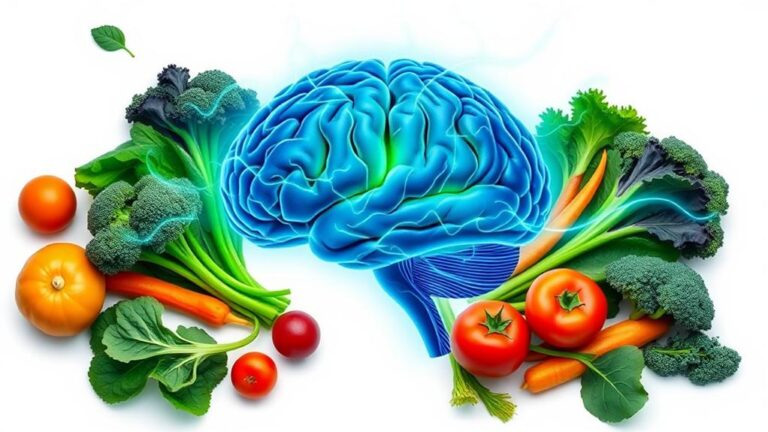When you think about transforming your body through weight loss, carb reduction might not be the first strategy that comes to mind, but it's worth considering. By adjusting your carbohydrate intake, you can shift your body's energy source and potentially enhance fat loss. This approach doesn't just focus on shedding pounds; it could also offer various health benefits that extend beyond weight management. If you're curious about how carb reduction can fit into your lifestyle and the common misconceptions surrounding it, keep exploring the possibilities.
Understanding Low Carb Diets
When it comes to low carb diets, you're entering a world of dietary choices that can greatly impact your weight loss journey. Low carb diets typically involve reducing your intake of carbohydrates, which are found in foods like bread, pasta, and sugar. Instead, you'll focus on consuming more proteins and healthy fats. This shift can help you feel fuller longer, making it easier to manage your calorie intake.
One key aspect of low carb diets is understanding carb intake limits, which typically range from 20 to 50 grams per day for ketogenic diets. Monitoring your net carbs and adjusting your intake based on individual tolerance is vital for success.
There are various types of low carb diets, such as the ketogenic diet, Atkins, and the paleo diet. Each has its own set of rules and carbohydrate limits, so it's important to choose one that aligns with your lifestyle and preferences. By understanding these diets, you can tailor your eating habits to fit your goals.
It's also important to pay attention to the quality of the carbohydrates you're reducing. For instance, replacing refined carbs with whole foods can lead to better health outcomes.
As you begin this dietary change, remember that it's not just about cutting carbs; it's about making informed choices that enhance your overall well-being. Your journey into low carb diets can be both exciting and transformative.
How Carb Reduction Aids Weight Loss
Carb reduction can be a game changer for your weight loss efforts. When you cut back on carbohydrates, you're not just making a dietary change; you're also transforming how your body processes food. By reducing carbs, you lower insulin levels, which helps your body burn stored fat for energy instead of relying on glucose.
This metabolic shift is known as ketosis, where your body efficiently uses fat for fuel. The keto diet, a popular low-carb approach, typically limits daily carb intake to 25-50 grams to achieve this state.
Here's how carb reduction can help you achieve your weight loss goals:
- Stable Energy Levels: You'll experience fewer energy crashes, keeping you motivated throughout the day.
- Reduced Cravings: Cutting carbs can help control your appetite, making it easier to stick to your plan.
- Faster Fat Loss: You may notice quicker results on the scale as your body taps into fat reserves.
Incorporating carb reduction into your lifestyle can lead to significant weight loss results. It encourages your body to switch from burning glucose to burning fat, promoting a more efficient metabolism.
And as you shed those extra pounds, you'll likely feel more confident and energized. So, if you're ready to take charge of your weight loss journey, consider the benefits of carb reduction—it might just be the key to revealing your success!
Health Benefits Beyond Weight Loss
Reducing carbs doesn't just support weight loss; it also brings a host of health benefits that can enhance your overall well-being. One of the most significant advantages is improved blood sugar control. Lowering your carb intake can help stabilize your blood glucose levels, reducing the risk of type 2 diabetes and helping those already diagnosed manage their condition more effectively. This approach aligns with the ketogenic diet principles, which promote a low-carb, high-fat eating plan to induce ketosis and optimize fat burning for energy.
Additionally, you might experience increased energy levels and reduced fatigue. When your body relies less on carbs for fuel, it becomes more efficient at burning fat, leading to sustained energy throughout the day. This shift can also improve your mental clarity, helping you focus better on daily tasks.
Moreover, many people report a decrease in inflammation after reducing carbs. This can lead to less joint pain and a lower risk of chronic diseases, contributing to a healthier you.
You may also find that your cravings diminish, making it easier to maintain a balanced diet over time.
Ultimately, embracing a low-carb lifestyle can offer you myriad health improvements that go beyond shedding pounds, allowing you to feel your best inside and out.
Common Low Carb Diet Misconceptions
Many people misunderstand low-carb diets, leading to confusion and hesitation about trying them. You may have heard that cutting carbs means you'll feel deprived or miss out on your favorite foods. But that's not necessarily true!
Let's clear up some common misconceptions.
- You'll feel lethargic: Many think reducing carbs will sap your energy, but many people experience increased energy levels once their bodies adapt to burning fat for fuel.
- It's a fad diet: Low-carb diets have been around for decades and are backed by scientific research. They focus on whole, nutrient-dense foods rather than processed options.
- You can't enjoy meals: People often believe low-carb means tasteless meals. In reality, there are countless delicious, satisfying low-carb recipes that can elevate your dining experience.
Tips for Successful Carb Reduction
Embracing a low-carb lifestyle can be a rewarding journey, especially when you know how to navigate it successfully. Start by setting clear, achievable goals. Instead of aiming for drastic changes, focus on small, manageable steps. For instance, try replacing high-carb snacks with healthier options like nuts or cheese.
Planning your meals is essential. Before you shop, create a list of low-carb ingredients that excite you. This helps you avoid impulse buys and guarantees you have tasty options on hand.
Don't forget to read labels—hidden sugars and carbs can sneak into seemingly healthy foods.
Stay hydrated and keep your body fueled. Drinking enough water can reduce cravings, while incorporating healthy fats keeps you satisfied longer.
Including plenty of vegetables in your diet is also crucial, as they're low in carbs yet high in nutrients.
Conclusion
By embracing carb reduction, you're not just shedding pounds; you're igniting a transformation that can light up your entire life. Picture yourself as a well-tuned engine, burning fat for fuel instead of struggling with sugar crashes. As you cut back on carbs, you'll notice more energy, fewer cravings, and a healthier you. So take that first step today, and watch how this journey not only reshapes your body but revitalizes your spirit. Your new life awaits!



